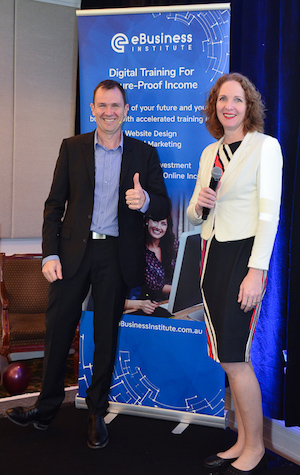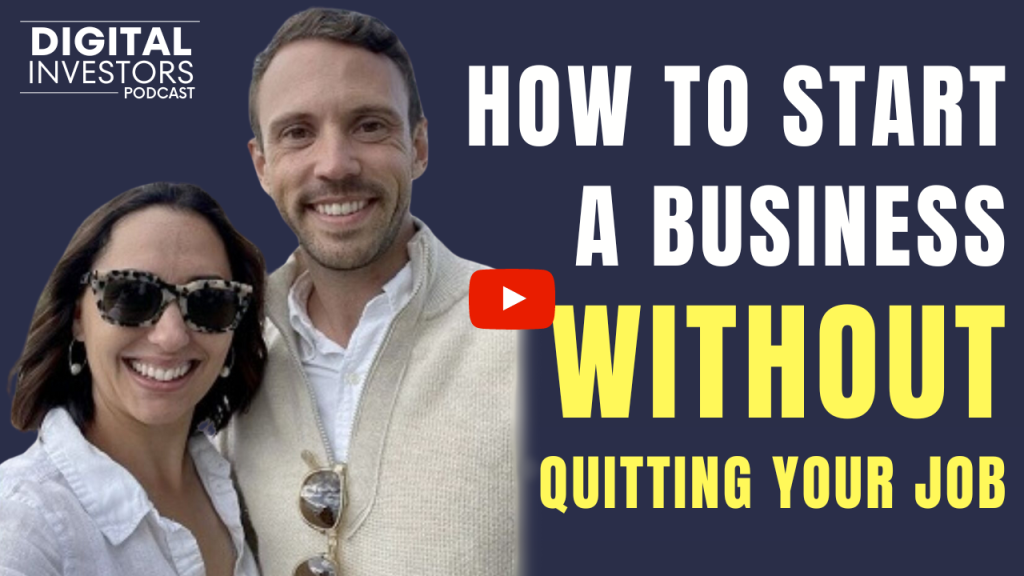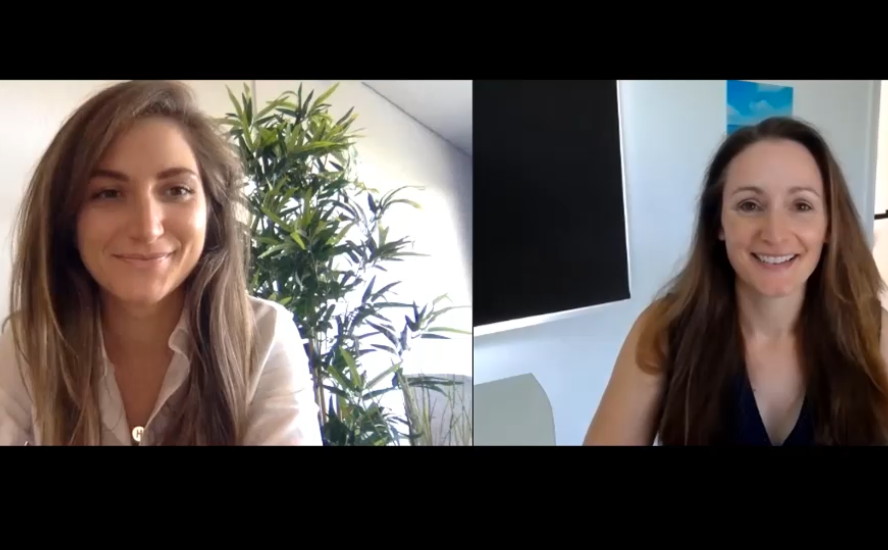Have you considered earning extra income from home by starting an online business?
With the recent changes to job security over the last year due to the pandemic, people are becoming more uncertain about their personal finances and how to support their family. The employment scene is definitely changing, but the good news is online businesses are thriving.
At our last 3-Day Digital Training Workshop, we showed hundreds of students from all different backgrounds and age groups how to start an online business. We show how retraining in digital skills can help you take control of your business and secure your future online.
We were fortunate enough to be joined by Australia’s leading online law expert, Jeanette Jifkins who is the founder of Onyx Law. Jeanette is a frequent presenter at our workshops and is not only a lawyer but an online entrepreneur. So, she knows what it takes to setup an online business and how to legally protect it.
Jeanette takes us through a range of important legal considerations when starting an online business.
How to Legally Protect Your Online Business Assets
As the author of book Cover Your Arse Online, Jeanette knows what it takes to be confident in Online Business. She shared with us some ways to help legally protect your online business assets. These are important things to consider whether you’re building websites for clients, or you’re starting your own online business.
In terms of running a business online, there are three main things to consider:
Consideration #1: Do you know where your money is coming from for your Online Business?
The first thing to look at is where’s the money coming from and then protecting that money. That’s really important. You want to make sure it’s easy for people to transact with you and make sure you know where the money flow is going so you can protect it.

Consideration #2: Is your Online Business in a regulated industry that must follow certain Compliance Rules?
Whether your building a website for a client, or an online business for yourself, you need to know what compliance issues are relevant. This can include health services, financial services, and legal services.
We all have a whole regulatory framework that we have to comply with. That’s our responsibility, it’s not yours. When selling your services at a higher rate, you want to be able to add value to your clients. As part of the assessment stage when building a website, you should find out if there are any compliance issues you need to be aware of.
For example, with health services in Australia, you’re not allowed to use testimonials. They wrote that into law, would you believe? Health service providers can’t use testimonials. Now, a lot of people won’t know that. Your client (if they’re a health service provider), should know that. If they don’t and you tell them, kudos to you. But it’s not necessarily your responsibility.
Just be aware that if you work with clients who are in a regulated industry, it’s a good question to ask. You can raise their level of thinking about how they are interacting with the public and what they should or shouldn’t be doing.
Consideration #3: Does your Online Business show credibility to your audience?

On the topic of credibility, I wanted to give you a real example of a client I worked with. My client asked me a few years ago to investigate a payment provider because the provider was new, they were cheaper than PayPal, and they did direct debits, etc.
So, I looked up the provider and found they had nothing on their website about what they do. But I could see they had been around for a couple of years. I found the owner on LinkedIn and I contacted her, asking, “Can you tell me a little about the background for your Financial Services Licence?” But she was very defensive and upset.
I just responded to her and said, “Well look, you’ve got a website, but you don’t have any of that information on it. It’s a really good opportunity to demonstrate your credibility. So why don’t you have your Financial Services Licence details, your business details and your contact details etc. added to the website? Because it just makes your business look more legitimate.” And, she fixed that very quickly!
So, particularly when you’re working with local businesses; if they’re concerned about putting information on the website, explain to them how it increases their credibility and makes them seem real and trustworthy and someone you want to work with.
Including Terms and Conditions, and Privacy etc. on your website also adds to the credibility as well. This helps people to understand that yes, these things can be important. Given that Google gets sued all over the world for privacy, I would think maybe their algorithms are looking for privacy pages on websites? Don’t know, but it makes sense.
So why would you not have a Privacy Policy? And particularly in this day and age where there’s suddenly a lot of interesting data security etc., it’s important to have a privacy policy. Just know where the information you’re collecting is held and how you’re dealing with it.
CLICK ON THE VIDEO BELOW to hear from Jeanette Jifkins how to Protect your Online Assets
The Importance of Registering and Keeping Domain Names
If you’re selling a website, are you selling the PO Box, or the house?
So, for those readers who use a PO Box – what happens if you do not pay your renewal at the end of the lease? They give it away. Your PO Box goes to someone else. Domain names must be protected the same way.
“You don’t own domain names, you lease them.” – Jeanette Jifkins, Onyx Online Law
You have a license to use that domain name so long as you keep paying for it.
Here’s a Tip: When you register a domain name, set up automatic repayments so that every time renewal comes up (every year or two years etc.), you get the warning email to say this is due for renewal and you have more than one automatic payment system.
If you’ve got a PayPal account, attach that to it because if one transaction fails, they can go to the other one. This just makes sure that you keep your right to use that domain name.
What rights do you have over a domain name when building a website?
I was talking to someone recently who said that someone they know, had a website built on a domain name by a friend. That friend had registered the domain name and they wanted to know how they can get it. Don’t be overly wedded to a domain name because the minimum cost of a dispute resolution process over domain names is $2,000, standard internationally.
If you go through any of the registrant systems to raise a dispute over ownership of a domain name, that’s what you pay upfront. So, if you lose a domain name, find something different. Don’t be overly concerned about it.
I did have someone with a name like Barbara Smith who said, “Someone’s using my name, can I get it?”. You can have one of the most common names in the world, but it doesn’t mean you have ownership rights to that.
And that’s the thing with domain names. You don’t have an ownership right unless you’ve got a registered trademark. It’s a first in, first served basis. So after that, it’s negotiation. If you do want a particular domain name that’s already taken, make sure you negotiate.
CLICK ON THE VIDEO BELOW to hear from Jeanette Jifkins how to register and keep your Domain Names
Avoid this Costly Mistake with your Domain Name when Selling an Online Business
When registering a domain name, your details must be kept up to date. If you change them, you can’t transfer that domain name for 60 days.
So if you are selling a website, make sure you do not change the domain name details within 60 days before you want the transfer to go through. If you do change details within this 60-day period, you might end up holding up your website sale.
I have an example of a client who purchased an online business. When we had a look at the business, we found out that they weren’t able to get the domain name for another 40 days. And so instead of paying out the purchase price on the date they had originally agreed, the purchase price was pushed back by another 40 days.
So just be aware of that. If you change registrant details, you’ve got 60 days before you can do anything with that domain name.
CLICK ON THE VIDEO BELOW to hear from Jeanette Jifkins how to avoid delays with the sale of your online business
What Makes a Domain Name More Valuable?
So is there a difference in valuation between a .com and a .com.au and a .co.uk or a .info or a .biz etc.?
We are constantly looking at different online businesses for sale, and in our research we still find that .com’s tend to be more popular. It’s like everything – domain names are like art or coins etc. If it’s rare, it’s more valuable.
So that’s why you’ll find that a one-letter domain name is way more valuable than a 20-letter domain name. Think about it – how many one-letter domain names are out there? Remember… where there’s a high demand, there’s a high price.
And once upon a time, the world’s most expensive domain name was 3 letters. You might guess what it is…it starts with S. The original owner let it go, and then it got resold for even more money.
3-letter domain names are extremely rare these days and so are 4-letter domain names. So remember, these rare domain names are worth a lot of money.
CLICK ON THE VIDEO BELOW to hear from Matt and Liz Raad what makes a domain name more valuable
Do you want to learn how to make money by Starting an Online Businesses?
For over 10 years Matt and Liz Raad have been teaching students from all over Australia how to buy and sell online businesses for profit. If you’re looking to replace your income, work from home online, or start an online business, then check out our free online training series: How to make money starting an online businesses.




